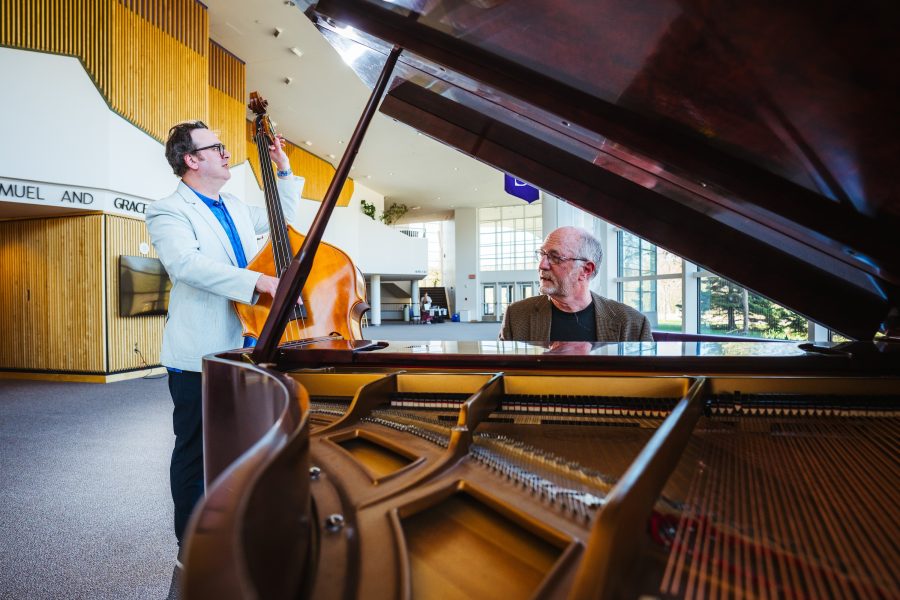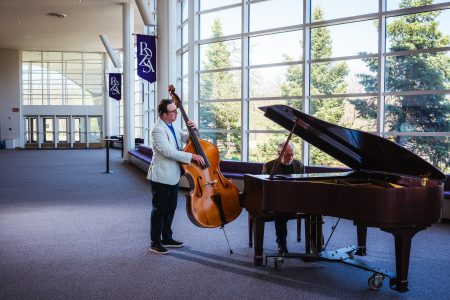
Professors, researchers, and university leaders Dan Fuhrmann and Tim Havens have full plates. But they make room in their lives for music as a way to create, connect, and cultivate community.
The duo has been playing together since 2012, when Fuhrmann, then chair of Michigan Tech’s Department of Electrical and Computer Engineering, hired Havens as an assistant professor.
Fuhrmann, the Dave House Professor of Computing, now chairs the Department of Applied Computing. Havens, the William and Gloria Jackson Professor of Computer Systems, is executive director of Michigan Tech’s Institute of Computing and Cybersystems (ICC) and director of the university’s Great Lakes Research Center. Both were musicians before they decided to pursue their studies in electrical engineering. In Haven’s case, music is what kept him in school.
His main instrument is bass. “I can also play keyboards, guitar, and trumpet, though none of them as well as the bass. I also sing when needed,” said Havens. “I was a musician and creative spirit well before I got into computing; in fact, my dream until later in high school was to go to music school.”
Havens acquired another dream as a high school junior, when his parents bought the family a computer. “I’m someone who loves to learn about everything—almost to a fault,” he said. “The first thing I did was take it apart and try to figure out how it worked. My mom was horrified that I had destroyed this crazy expensive tool, but it all worked fine when I put it back together.”
Havens sees creativity as a yearning for discovery. From his perspective, the same desire that propelled him into music compelled him to disassemble his first computer. “I also believe that music instilled a discipline in me before I really started working hard at becoming an expert in science and engineering,” he said. “To be functional as a musician, you have to practice a lot, hammer the rudiments, and know the fundamentals. And you have to exercise daily, as it’s ultimately a bunch of really small muscles that have to work hard and synchronously for long periods of time. It’s the same thing for anything that requires hard work and discipline.”
Music led Havens into the field of electrical and computer engineering, which remains a big part of his research focus. And when he felt like quitting, the musical correlations to what he was studying kept him going.
“In my third year of electrical engineering, I was pretty down on the experience. I just didn’t find interest in what I was learning,” Havens said. “But then I took a signal processing course, learning about how signals are composed of both time and frequency components. And it all just clicked—it was everything I intuitively had learned as a musician. Plus it gave me a new perspective on the things I understood from the music side. It ultimately saved my education because I don’t believe I would have finished school if that moment of clarity hadn’t happened.”

Fuhrmann, who has played piano since he was 6 years old, said his musical training also helped with his undergraduate studies in electrical engineering.
“You’ll find a lot of electrical engineers who double as musicians,” he said. “There is a natural connection that results from an understanding of concepts of time, frequency, communication theory, and signal processing, as Tim alluded to. They influence each other.”
Fuhrmann sticks to one instrument. “I only play keyboards. I used to sing in a previous life, but trust me, you don’t want to hear me sing now,” he said. “I like acoustic piano—I have a seven-foot Baldwin grand at home—and my regular professional rig is a Nord Piano 88 electronic keyboard combined with a small Hammond electronic organ. All the modern advances in electronic instruments, especially the amazing keyboards with sampled sounds like the Nord, are applications of electrical engineering.”
Fuhrmann took classical lessons through elementary and junior high school. “I got into jazz in high school, where my school had an excellent jazz ensemble,” he said. “Two one-week summer camps with the traveling Stan Kenton Jazz Camps were quite influential.”
As his career took shape, Fuhrmann continued to work on his craft. “In graduate school, I took privatelessons with jazz pianist Phil Markowitz in New York. In the 1990s I got into salsa and Latin music, and played with a 12-piece salsa band in St. Louis from 1993 to 2008.” In Houghton, Fuhrmann played for several years with regional favorites Steve Jones and the Garden City Hot Club, including a regular Thursday night gig in the lounge atop what was then the Magnusson Inn in downtown Houghton. “I’ve played with other musicians and groups including Tim, Bob Hiltunen, and Uncle Floyd,” said Fuhrmann. Havens also plays with other campus and community musicians, most recently Steve Jones and the Tall Grass Brass Band.
About the College of Computing
The Michigan Tech College of Computing, established in 2019, is the first academic unit in Michigan dedicated solely to computing, and one of only a handful such academic units in the United States. The college is composed of two academic departments. The Computer Science department offers four bachelor of science programs in computer science, cybersecurity, data science, and software engineering; four master of science programs in applied computer science, computer science, cybersecurity, and data science; and a doctoral program in computer science. The Applied Computing department offers four bachelor of science programs in cybersecurity, electrical engineering technology, information technology, and mechatronics; two master of science programs in health informatics and mechatronics; and a doctoral program is in computational science and engineering.
Questions? Contact us at computing@mtu.edu. Follow the College of Computing on Facebook, Instagram, LinkedIn and Twitter.
